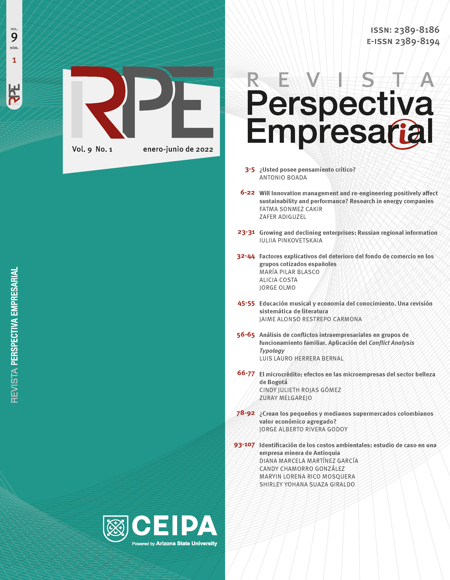Growing and declining enterprises: Russian regional information
Growing and declining enterprises: Russian regional information
##plugins.themes.bootstrap3.article.main##
Objective.
To evaluate the values of indicators describing the specific weights of growing and declining enterprises in the total number of active enterprises in Russia in 2020, as well as the number of growing enterprises and declining enterprises per thousand people living in each of the Russian regions. Methodology. The methodology is based on the models, which are density functions of normal distribution. Results. The research proved that growing and fading enterprises are relatively rare among commercial organizations, and there was a significant differentiation through the regions of the discussed indicators. The regions with the maximum and minimum values of indicators are given. Conclusions. The paper adds new knowledge about growing and declining enterprises in Russia. The work results can be applied by governments and public organizations when justifying measures to support enterprises characterized by an increase in the number of employees.
Downloads
##plugins.themes.bootstrap3.article.details##
Aggarwal, A. and Sato, T. (2015). Identifying High Growth Firms in India: An Alternative Approach. Kobe, Japan: Research Institute for Economics and Business Administration, Kobe University.
Amorós, J., Fernández, C. and Tapia, J. (2012). Quantifying die relationship between entrepreneurship and competitiveness development stages in Latin America. International Entrepreneurship and Management Journal, 8(3), 249-270. DOI: https://doi.org/10.1007/s11365-010-0165-9
Ascigil, S.F. et al. (2008). Downsizing and Restructuring in Smaller Firms: Survivors’ Perceptions. Business & Professional Ethics Journal, 27(1/4), 103-116. DOI: https://doi.org/10.5840/bpej2008271/45
Bozhko, L.M. (2020). Development of gazelle firms: features and success factors. Tver State University Bulletin. Series: Economics and Management, 3(51), 59-67. DOI: https://doi.org/10.26456/2219-1453/2020.3.059
Bravo-Biosca, A., Criscuolo, C. and Menon, C. (2016). What Drives the Dynamics of Business Growth? Economic Policy, 31(88), 703-742. DOI: https://doi.org/10.1093/epolic/eiw013
Choi, T. et al. (2017). The Effects of High Growth on New Business Survival. Review of Regional Studies, 47(1), 1-23. DOI: https://doi.org/10.52324/001c.8025
Cusolito, A.P. and Maloney, W.F. (2018). Productivity Revisited: Shifting Paradigms in Analysis and Policy. Washington, USA: International Bank for Reconstruction and Development. DOI: https://doi.org/10.1596/978-1-4648-1334-4
Aggarwal, A. and Sato, T. (2015). Identifying High Growth Firms in India: An Alternative Approach. Kobe, Japan: Research Institute for Economics and Business Administration, Kobe University.
Amorós, J., Fernández, C. and Tapia, J. (2012). Quantifying die relationship between entrepreneurship and competitiveness development stages in Latin America. International Entrepreneurship and Management Journal, 8(3), 249-270. DOI: https://doi.org/10.1007/s11365-010-0165-9
Ascigil, S.F. et al. (2008). Downsizing and Restructuring in Smaller Firms: Survivors’ Perceptions. Business & Professional Ethics Journal, 27(1/4), 103-116. DOI: https://doi.org/10.5840/bpej2008271/45
Bozhko, L.M. (2020). Development of gazelle firms: features and success factors. Tver State University Bulletin. Series: Economics and Management, 3(51), 59-67. DOI: https://doi.org/10.26456/2219-1453/2020.3.059
Bravo-Biosca, A., Criscuolo, C. and Menon, C. (2016). What Drives the Dynamics of Business Growth? Economic Policy, 31(88), 703-742. DOI: https://doi.org/10.1093/epolic/eiw013
Choi, T. et al. (2017). The Effects of High Growth on New Business Survival. Review of Regional Studies, 47(1), 1-23. DOI: https://doi.org/10.52324/001c.8025
Cusolito, A.P. and Maloney, W.F. (2018). Productivity Revisited: Shifting Paradigms in Analysis and Policy. Washington, USA: International Bank for Reconstruction and Development. DOI: https://doi.org/10.1596/978-1-4648-1334-4



































